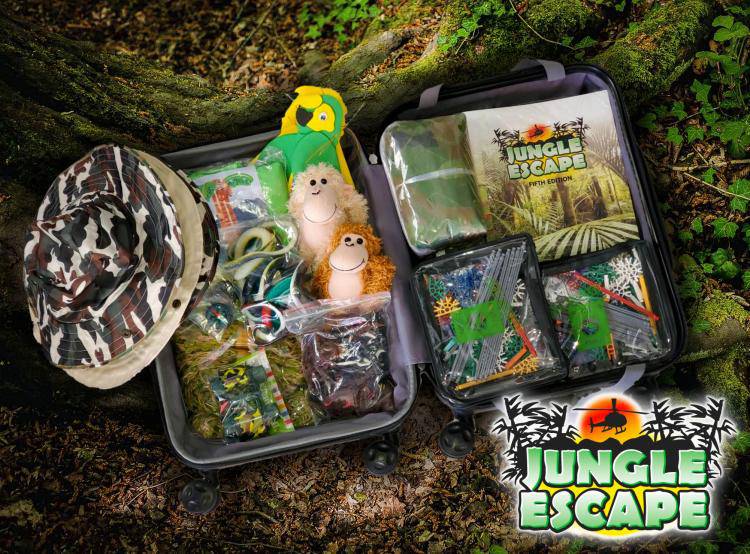Share
Should Workplace Team-Building Games Be Competitive?
Bradford R. GlaserTeam building competitions are a great way to encourage your team to work together. Your staff tends to participate more actively during these activities. They also become more creative and show talents you might not see during standard workdays. When you try competitive activities, they can create better memories than standard training sessions and improve how your team members find new ways to communicate with each other. There are many documented benefits, and there's a good reason that these are as popular as they are.
But you have to be careful to balance the competitive elements with their possible downsides — it's entirely possible for them to backfire. Some of your employees might disconnect when the competition feels too intense for them. Remember that negative feelings from poorly designed contests appear immediately after the game ends. People with different personalities will respond in different ways to competitive pressure. Depending on the team, you'll achieve better results when you pick activities that combine healthy competition with goals that help with collaboration.
You'll hit the right balance when you create situations with friendly competition that still deliver real teamwork.
Let's talk about it!

- Builds effective teamwork skills
- Improves group problem solving
- Boosts decision making skills
Table of Contents
- What Are the Competitive Benefits and Risks?
- How Can Inclusive Competitions Be Designed?
- What Are Some Examples of Team Competitions?
- How Can You Have Both Competition and Collaboration?
- How Can Performance Pressure Be Managed?
- What Strategies Can Build Team Trust?
- Team Building with Lasting Connections
What Are the Competitive Benefits and Risks?
Team-building games at work can definitely be competitive. That comes with downsides. You'll frequently see teams showing more energy and creativity when they have something to win. People usually get more excited about joining in when there's a prize at stake or when they can beat another team — this friendly competition can turn what could be boring training into something that's more fun.
When you work together to win, it helps you and your teammates find new ways to communicate. You might find out who's naturally skilled at leading or solving challenges. After the game ends, these skills frequently move back to your standard work tasks. People like to remember competitive activities more fondly than standard meetings or training sessions.

However, competition doesn't always create positive feelings in the workplace. You'll find that some people feel left out or stressed when games become too competitive. Not everyone enjoys the pressure that comes with trying to win. Team members who don't have a competitive nature might disconnect from the activity altogether.
Bad feelings can grow when the competition gets too intense. Your team members might start blaming each other when they lose or develop resentment toward the teams that win. These negative emotions don't just disappear when the game ends — they follow everyone back to their desks. In some cases, competitive games actually create new divisions between people who have worked well together before.
Your workplace already has enough pressure without adding more through these games. Employees also worry about looking bad in front of their boss during these competitive activities. They might think that not doing well in a game will change how managers view their work abilities — this added stress works against what you're trying to achieve with team building.
Different people respond to competition in different ways. Some of your team members get motivated by contests. But others like to work together without declaring winners and losers. What works for your sales team won't work the same way for your accounting department. Your company culture also plays a big part in picking how much competition makes sense.
It's hard sometimes to find the right balance. That being said, you should try to use games that combine competitive and cooperative elements. They tend to be more helpful than purely competitive ones, and this mixed strategy captures the energy that competition brings while still helping people work together as a team.
How Can Inclusive Competitions Be Designed?
When you design some competitions that get everyone involved, your team-building work will be more helpful. You want to set up some games where your employees feel welcome because they matter. You should make the rules easy to understand so everyone knows what they're for. Also, you don't want your team members to be guessing about how to win.
You'll create some better games when you get ideas from different people. You can try reaching out to people in different departments about the activities they like. Someone who's working in accounting probably has different thoughts than a person from marketing. When you integrate these different suggestions, more people will want to join the fun.
Flexible activities get more people involved. Some of your team members could be naturally athletic, though others do better with problem-solving challenges. The helpful games usually have opportunities for different strengths and abilities. This gives everyone a chance to help their team succeed.

You should try to explain the rules in a few different ways so everyone gets them. Some people can understand written instructions better. But others need to see some demonstrations. When you use these strategies, your whole team gets on the same page faster.
You should try to test your competition format before the event. You can run through the activity with a small group and watch for any problems. You might need to adjust some of the rules to make the game more helpful.
Your team will have more energy when you give them some breaks and different ways to participate. You should remember that not everyone wants to join at the same level. When you create some alternative ways to contribute, people feel that you respect their boundaries. Your team members will like that you're aware of their personal limits.
The games that work best can bring teams closer instead of creating bad feelings. When your competitions show how to work together within the contest, everyone walks away with something helpful. Your people can learn about their coworkers' strengths and find some better ways to collaborate. These plans usually get your team working long after the games end.
What Are Some Examples of Team Competitions?
You'll find different types of competitive team-building activities at work these days. Businesses everywhere use these activities to help their teams work well together. Take hackathons, just to give you an example — they're events where the teams race against each other to solve some coding challenges. Tech businesses frequently use them to get their staff thinking creatively and coming up with new ideas.

Business simulations give your team another way to build some connections. Your team members might run some made-up businesses and try to do better than other teams in a pretend market — this helps people practice business skills while enjoying some time with their coworkers.
Escape rooms have recently become popular for workplace teams. You and your colleagues need to work together to figure out the puzzles and "escape" before time runs out. These challenges show which teams can talk to each other well under pressure and think creatively when they face challenges.
Also, if you want something more relaxed, you can try organizing some trivia competitions. Your teams can answer questions about different topics, which usually get people talking and laughing together. Trivia works in offices where some people might feel uncomfortable with more physical activities.
Step challenges let teams track their walking and compete for the highest numbers. These competitions frequently run for a few weeks or even months. Employees like how these challenges combine health goals with team bonding without the need for any talent.
Sales competitions happen in businesses that can measure the results. Your teams might try to reach the highest sales numbers or bring in the most new customers. Since the sales work already has a competitive ingredient, these contests feel like a natural part of the job.
Your teams can race to raise the most money for worthy causes or volunteer the most hours.
How Can You Have Both Competition and Collaboration?
Competitive team-building games don't create any conflict if you use them. They can also bring your team together in ways that you might not expect. When you set them up right, these games can get everyone to put in more effort and share what they're good at. They can spark something in your team that makes everyone perform better.
The real magic happens when you combine competition with teamwork. Instead of having your employees compete against each other, try having them work together against another team — this way, they still get that motivation to win. But they do have to help each other to make it happen. Everyone focuses on the shared goal instead of trying to outdo the person sitting next to them.
Studies have shown that teams who face challenges together build stronger connections with each other. They develop trust faster than the teams who only do standard activities. The bonds they form don't just disappear after the game — they can carry over into work. When your team members go through ups and downs together, they create long-term memories that help them connect.

Businesses see changes after they add the right combination of games to their team building. Teams that hardly spoke to each other started sharing ideas without any hesitation. You might see someone who never speaks up in meetings suddenly take charge during these activities. That quiet person from IT might show off their great problem-solving abilities when they're racing to finish a challenge.
You'll get the best results if you pick games that need skills from everyone on your team — this gives each person an opportunity to look good. Nobody feels sidelined or unnecessary in this way. Just to give you an example, one team member might be good at solving puzzles, and another person might work well under pressure.
It's important to find the right balance when you plan these activities. If you make things too competitive, you risk creating negative feelings that might sit around afterward. But if you don't make it hard enough, people will just get bored. You want to find that middle ground where everyone feels pushed for their best without feeling stressed out. Your team should leave feeling proud of what they have had together.
Team building works best when your employees forget they're still technically at work. The laughter and shared challenges help to break down barriers between different departments. You'll see the finance department and marketing team suddenly realize they have things in common. They start seeing each other as people with personal strengths and quirks.
How Can Performance Pressure Be Managed?
Competitive team-building games can sometimes make some people feel stressed out. People handle pressure differently. Some of your team members love competition and do their best work. But others worry about it and start to shut down.
You should always talk about what to expect before you get started with any competitive activities. Also, make it very clear to your team that having fun matters more than winning — this takes some of the pressure off people who might worry about how well they perform.
You can tell when someone puts in extra effort or helps their teammates during the game. Even a little recognition goes a very long way!
It helps with pressure, too, when you break games into smaller steps. Your team members will feel less stressed when they can have one small challenge at a time — this works especially well for people who get nervous about big competitions.

You should teach your team some easy breathing exercises they can use when feeling pressured. It can help someone feel more relaxed by taking a few deep breaths. These helpful techniques work well during team activities and standard work situations, too.
You should encourage your team to practice positive thinking. When people say encouraging things to themselves and others, they're able to manage competition better. Negative thoughts during games will make stress worse and hurt how well people perform.
Make sure that your team knows it's okay to make mistakes. Your people will join more willingly when they know that nobody will judge them for messing up. You might want to set some ground rules about how team members should treat each other.
You should try to rotate people between different roles during competitive activities — this spreads the pressure around instead of forcing the same few people to carry the team. It also gives everyone a chance to work with different colleagues and learn new skills.
What Strategies Can Build Team Trust?
Your team can trust each other while competing. Teams who trust each other create the most productive competitions. You'll find that team members feel comfortable taking risks and pushing boundaries when they know others support them. This kind of safety develops when you're confident your teammates will stand by you during hard moments.
You can also build this trust through open communication. Your team needs to talk about strategies, anxiety, and new ideas without having to worry about judgment. Team members are more helpful when they share their thoughts freely. This open strategy can help you solve challenges faster during competitions.
Leader transparency can make a real difference in team competitions. You'll see people engage more willingly when managers explain their reasons for picking activities and what they hope you'll learn. Team members connect better with the job behind the competition. This clarity helps you plan these activities with a positive mindset.
Support matters as much as how you communicate with others. Make sure to cheer for your teammates and help them when they need it. Basic actions like giving a high-five or saying something encouraging build stronger connections. These small gestures create a workplace where everyone feels appreciated.

It helps to keep trust steady during team competitions. You can apply the same rules to everyone on the team. You'll find people participate more when they know what to expect. Fair treatment prevents hurt feelings and avoids any sense that some team members get special treatment.
You should remember to gather everyone after competitions to strengthen trust and team bonds. When you take time to acknowledge what each person contributed, you show that winning isn't the only goal. It's about growth and learning instead of just who won. Your team will remember how you treated them long after they've forgotten the final score.
The personal connections that you build during these activities will continue well past the event itself. You get new respect for your teammates when you see their strengths and weaknesses firsthand. Through competitions, you learn who performs well under pressure and who comes up with creative solutions. You can then apply this knowledge to work situations.
When leaders choose to join their teams, they can show vulnerability and become more approachable. This participation breaks down the barriers that might otherwise keep real connections at bay. You start to see your managers as more human when they face the same challenges as you do.
Team Building with Lasting Connections
What makes team activities work is how well they're put together. When you combine friendly competition with teamwork, you actually generate energy and connections that last well past the event. Teams like to get more from these experiences when everyone feels supported and included, which makes people comfortable sharing their talents and taking risks.
Think back to your team-building experiences. Which ones do you remember the most? Was it what you did or who you connected with during the activity? The best team moments happen when everyone feels they can contribute something, whether they're naturally competitive or like working together.

Team building works when it strengthens relationships and helps people collaborate afterward. Successful team experiences break down the barriers between departments and help people see different sides of their coworkers. Do you feel your workplace is different after a great team activity?
Businesses have had some great results with Jungle Escape — this survival game by HRDQ has been bringing teams together for over 30 years, challenging them to build a helicopter with limited supplies. As people work toward this common goal, they naturally get better at planning, solving challenges, and working through disagreements.
If you want something that balances friendly competition with real teamwork, this adventure might also be just what your team needs!




















































